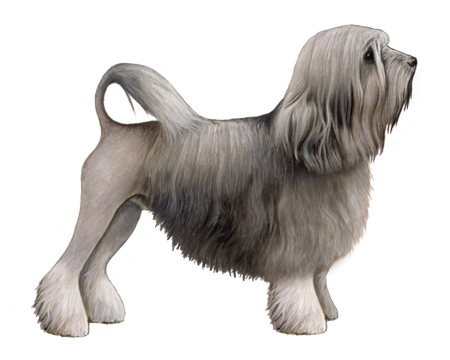
Löwchen
It's not just the haircut that gave the Löwchen the nickname "little lion." These little dogs are said to be as brave as lions. Though they may run after squirrels and bark at big dogs, the Löwchen is a lover, not a fighter, and wants nothing more than human companionship.
Interested in discovering if your dog is a Löwchen?
Check out Wisdom Panel's DNA tests.
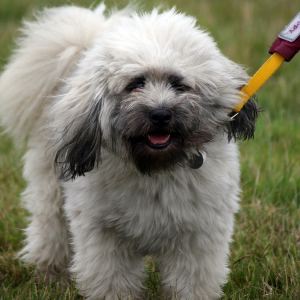
Löwchen Traits
General Appearance
Löwchen are small, bright dogs with alert expressions, compact, well-balanced bodies, and outgoing, positive attitudes that make them popular pets.
Coat and Colouring
Löwchen have long, dense hair that has a soft texture and moderate wave. The hair is thicker around the neck and withers. Their natural coats can fall to either side but, according to the breed standard, there should be no part, and the unclipped areas of the coat cant' be trimmed. Puppies have softer coats than adults. The coat comes in all colors, including black, blue, chocolate, cream, fawn, red, silver, and white.
In the show ring, Löwchen must have the traditional lion clip. The coat is clipped short from the last rib to the back, including the hindquarters and tail. Cuffs of hair on all four legs and a plume of hair at the end of the tail remain.
Distinctive Physical Traits
Löwchen have off-square bodies that are more long than tall. They have muscular hindquarters, large, round eyes set well apart, pendant, well-fringed ears, and broad, rounded muzzles. Löwchen have high set tails that are well arched and carried in a cup handle fashion, with the plumes touching their backs during movement.
Löwchen Temperament
The little lions are alert and intelligent. Originally bred as companions, Löwchen have retained all of the qualities that made them popular as four-legged best friends—including outgoing, affectionate, and curious personalities.
Löwchen might be brave like lions, but they're also big-hearted dogs that love children and other animals. They use their charm to turn strangers into friends—but that doesn't keep them from barking at much bigger dogs. These are genuine companion animals that want nothing more than the love and adoration of their families and strangers alike.
Löwchen are independent, and their small size, adaptable demeanors, and calm personalities make them well suited to apartment living. Training can help control their desire to bark.
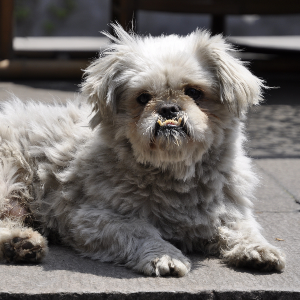
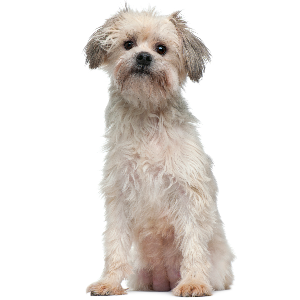
Löwchen History
There is disagreement about the origin of the Löwchen. The breed might have a German name, but Löwchen were also popular in countries like France, Holland, Spain, and Russia. Löwchen might have descended from the same ancient companion breeds that led to the development of the Bichon Frise and Maltese.
Löwchen are an older breed that appeared—with their lion cuts—in paintings, tapestries, line drawings, and other Renaissance artwork dating back to the 1500s. It's believed that European noblewomen groomed Löwchen to give them the appearance of lions. They hunted vermin and barked at suspicious noises in exchange for love and affection.
The Löwchen population was in decline until breed fancier Madame Bennert undertook extensive breeding efforts in 1945.
Löwchen Care
Nutrition
Feed Löwchens high-quality dog food that is appropriate for their life stage (e.g., puppy, adult, senior). A diet formulated for small breed dogs is a good option to consider. Portion out their food with a measuring cup to avoid over-feeding and limit treats to no more than 10% of their daily calories to keep Löwchen from becoming overweight.
Grooming
Löwchen are non-shedding and considered a hypoallergenic breed. Their regular (not clipped) coats don't require much more than regular brushing and an occasional bath. It takes time and commitment to achieve (and maintain) the traditional lion cut, and professional grooming is likely required.
In addition to clipping their nails and cleaning their ears, Löwchen need regular dental care. Establish a routine that includes at-home teeth brushing when they are puppies and consult a veterinarian about professional cleanings to ensure good oral hygiene throughout their lives.
Exercise
Löwchen love long walks in the neighborhood, romps at the dog park, or games in the yard. They are a moderately active breed and appreciate a good challenge. Look for activities that combine mental and physical stimulation, such as competitive obedience, agility, or musical canine freestyle.
Löwchen are a social breed. They enjoy tagging along on errands and participating in group classes where they interact with people and animals. Play interactive games like fetch and hide-and-seek to bring out their social sides.
Training
Training that emphasizes basic commands can help Löwchen become well-mannered companions. It's also important to teach them that excessive barking is not welcome. They are intelligent dogs that learn fast as long as training methods are positive and reward-based. Löwchen do not respond well to harsh corrections.
Löwchen Genetic Health Conditions
-
Chondrodystrophy (CDDY) and Intervertebral Disc Disease (IVDD) Risk
Chondrodystrophy (CDDY) is a skeletal disorder characterized by shortened limbs and abnormal early degeneration of the spinal discs, or intervertebral disc disease (IVDD), which predisposes to disc herniation.
Knowing if your Löwchen is a carrier or at-risk for these conditions can help you and your veterinarian plan for your pup's lifelong care. With Wisdom Panel™ Premium, you can get results for over 200 genetic health tests.
Breed Group
Companion
This group consists of dogs typically bred for the specific purpose of human companionship, and many are popular pets because of their gentle nature. They became more common as the concept and luxury of dogs as pets prevailed.













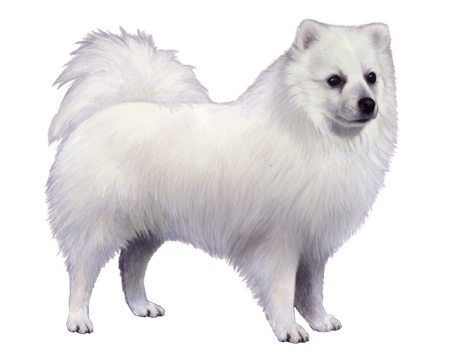













_Color.png)










